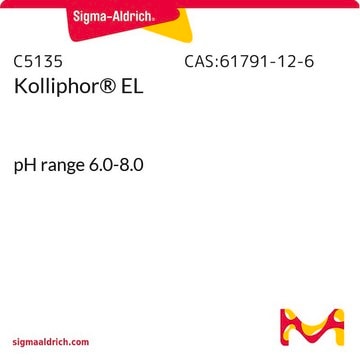S8281
Safflower seed oil from Carthamus tinctorius seed
Sign Into View Organizational & Contract Pricing
All Photos(1)
About This Item
Recommended Products
biological source
plant seeds (Carthamus tinctorius)
form
liquid
refractive index
n20/D 1.476 (lit.)
density
0.921 g/mL at 25 °C (lit.)
functional group
carboxylic acid
oleic acid
lipid type
oils
shipped in
ambient
storage temp.
room temp
Looking for similar products? Visit Product Comparison Guide
Application
<ul>
<li><strong>Anti-osteoporosis effects of mammalian lignans and their precursors from flaxseed and safflower seed using zebrafish model:</strong> The study investigates the potential health benefits of safflower seed oil in preventing osteoporosis, highlighting its utility as a dietary supplement (Yang et al., 2023).</li>
</ul>
<li><strong>Anti-osteoporosis effects of mammalian lignans and their precursors from flaxseed and safflower seed using zebrafish model:</strong> The study investigates the potential health benefits of safflower seed oil in preventing osteoporosis, highlighting its utility as a dietary supplement (Yang et al., 2023).</li>
</ul>
Physical form
Raw oil without preservative
Storage Class Code
10 - Combustible liquids
WGK
awg
Flash Point(F)
Not applicable
Flash Point(C)
Not applicable
Personal Protective Equipment
dust mask type N95 (US), Eyeshields, Gloves
Certificates of Analysis (COA)
Search for Certificates of Analysis (COA) by entering the products Lot/Batch Number. Lot and Batch Numbers can be found on a product’s label following the words ‘Lot’ or ‘Batch’.
Already Own This Product?
Find documentation for the products that you have recently purchased in the Document Library.
Customers Also Viewed
Young Taek Oh et al.
Physiology & behavior, 167, 194-201 (2016-10-25)
Previous rodent studies showed that when injected into the brain, free fatty acids (FFAs) reduced food intake in an oleate-specific manner. The present study was performed to test whether food intake is regulated by circulating FFAs in an oleate-specific manner.
K G Lamping et al.
Diabetes, obesity & metabolism, 15(2), 144-152 (2012-09-07)
The ability of dietary enrichment with monounsaturated fatty acid (MUFA), n-3 or n-6 polyunsaturated fatty acids (PUFAs) to reverse glucose intolerance and vascular dysfunction resulting from excessive dietary saturated fatty acids is not resolved. We hypothesized that partial replacement of
Husain Attarwala et al.
Pharmaceutical research, 29(6), 1637-1649 (2012-01-28)
To develop a safe and effective non-viral vector for gene delivery and transfection in macrophages for potential anti-inflammatory therapy. Solid nanoparticles-in-emulsion (NiE) multi-compartmental delivery system was designed using plasmid DNA-encapsulated type B gelatin nanoparticles suspended in the inner aqueous phase
Christopher M Mulligan et al.
Cardiovascular research, 94(3), 460-468 (2012-03-14)
Cardiolipin (CL) is a tetra-acyl phospholipid that provides structural and functional support to several proteins in the inner mitochondrial membrane. The majority of CL in the healthy mammalian heart contains four linoleic acid acyl chains (L(4)CL). A selective loss of
Yong Ji et al.
American journal of physiology. Gastrointestinal and liver physiology, 302(11), G1292-G1300 (2012-03-31)
Previous studies have linked certain types of gut mucosal immune cells with fat intake. We determined whether fat absorption activates intestinal mucosal mast cells (MMC), a key component of the gut mucosal immune system. Conscious intestinal lymph fistula rats were
Our team of scientists has experience in all areas of research including Life Science, Material Science, Chemical Synthesis, Chromatography, Analytical and many others.
Contact Technical Service









